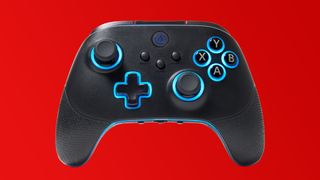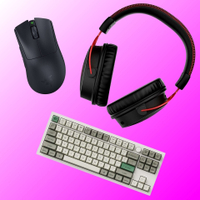Cheap but very cheerful? PowerA's wireless controllers feature Hall effect sensors and start at just $50
Hall effect controllers are often fairly pricey, but these new models might buck the trend.

If you've been shopping around for your next gaming controller, chances are you might have come across the term "Hall effect" in reference to the sensors inside. Essentially, Hall effect sensors measure the strength of a magnetic field to detect movement, as opposed to regular input sensors that rely on physical contact. That means they don't wear out like traditional units, avoiding stick drift and a host of other problems. Trouble is, controllers using this sensor method often don't come cheap.
PowerA's new controllers, however, are surprisingly reasonably priced. There's the OPS v1 for $50 and the OPS V3 Pro for $100. Both are input devices with that now-familiar Xbox-style shape, asymmetrical thumbsticks, and a host of features. All importantly, however, both have Hall effect sensors under the thumbsticks and triggers, which should make them stick-drift immune.
The cheaper of the two, the PowerA OPS v1, is pretty feature-packed for something the same price as a default Xbox Wireless controller. You get 3-way trigger locks, four mappable rear buttons, a programmable Turbo button and a rechargeable battery—along with those fancy sensors, of course. That rechargeable battery is a boon for the money, as it still annoys me that the default Xbox controller wants you to swap batteries in and out as standard in 2024.
The PowerA OPS v3 Pro bumps those rear buttons up to a full complement of six, along with a bigger battery, included charging stand and some shiny multi-zone RGB lighting. You also get tactile mechanical switches under the D-pad, face buttons and shoulder buttons, along with adjustable height thumbsticks.
That's quite the feature set for a $100 controller. Our current pick for the best premium controller, the Xbox Elite Wireless Controller Series 2, has many of the same features but lacks the all-important Hall effect goodies. It's also got an MSRP of $160, although admittedly you can sometimes find it cheaper if you shop around.




It does have a magnificently premium feel, however, and time will tell if the PowerA models can match up in the build quality stakes.
The best Hall effect controller we've tested to date is the Turtle Beach Stealth Ultra, and one of those will set you back $200, although it does come with a fancy built-in colour screen. Still, given that even the OPS v3 Pro is literally half the price, it looks like the Turtle Beach has some serious competition on its hands.
The biggest gaming news, reviews and hardware deals
Keep up to date with the most important stories and the best deals, as picked by the PC Gamer team.
We'll be looking to get our hands on these for some proper testing, but glancing at the spec sheets alone suggests that you're getting a lot of bang for your buck here. Still, controllers are all about the feel in your hands, so hopefully, PowerA hasn't skimped out on the materials to get them down to such a reasonable price point.
After all, smooth sensors aren't the be-all and end-all of controller design. It's a pretty good start though, and getting your hands on a controller featuring them for this cheap is promising. Is this the start of all major controllers getting Hall effect sensors and proper built-in battery solutions, even at the more budget end of the market? One can only hope.
Best gaming mouse: the top rodents for gaming
Best gaming keyboard: your PC's best friend...
Best gaming headset: don't ignore in-game audio

Andy built his first gaming PC at the tender age of 12, when IDE cables were a thing and high resolution wasn't. After spending over 15 years in the production industry overseeing a variety of live and recorded projects, he started writing his own PC hardware blog in the hope that people might send him things. And they did! Now working as a hardware writer for PC Gamer, Andy's been jumping around the world attending product launches and trade shows, all the while reviewing every bit of PC hardware he can get his hands on. You name it, if it's interesting hardware he'll write words about it, with opinions and everything.
Most Popular





